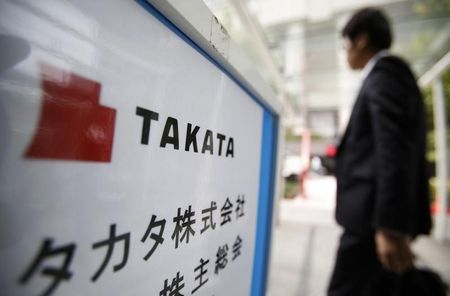By Paul Lienert
DETROIT (Reuters) - Takata Corp disclosed for the first time that it began making air bags with a recently discovered flaw as early as 2008, in a report to the U.S. National Highway Traffic Safety Administration that the agency released on Saturday.
Takata sent the report to the NHTSA this week, providing details on the defect and the dates of its manufacture, 2008 to 2014. It was the latest revelation related to problems with Takata air bags that have led to the recall of 17 million cars worldwide.
The new flaw was discovered in June: a driver-side air-bag inflator may contain a bad part that could cause the inflator to rupture. So far, two manufacturers, General Motors Co and Nissan Motor Co, have recalled a combined 30,867 cars to address the problem.
However, those cars came only from model years 2013-2014. In the report released today, Takata said it had been making the parts from 2008 through June 2014 at Takata's Monclova plant in Mexico.
The report also said ruptures in the airbags installed on General Motors vehicles showed a "very different" pattern from those in cars made by other manufacturers that were recalled for similar problems.
Takata's latest report does not say how many more vehicles could be affected by the new problem. A Takata spokesman did not respond immediately to a request for comment.
While the cause of the rupture in the GM and Nissan cars is different, the result is similar: air bags can explode with excessive force in a crash and send metal shards into the vehicle's cabin. At least four deaths and more than a dozen injuries have been linked to the defective air bags.
The latest problem, involving the installation of an incorrect baffle, was uncovered after a lawsuit was filed against GM and Takata in April. That suit alleged that an October 2013 accident left a Georgia woman, Brandi Owens, blind in one eye and claimed her car and driver-side air bag were "defective and unreasonably dangerous."
Since 2008, 10 manufacturers have recalled more than 10 million cars in the United States equipped with Takata air bags. The manufacturers have cited a variety of reasons why the air bag inflators can rupture, including design and manufacturing flaws.
Takata, meanwhile, is struggling to keep up with demand for replacement parts for the earlier recalls. On Thursday, Takata agreed to add two production lines in January to make more air bag parts.
In a statement released late Friday, NHTSA said, "It's unclear yet whether that would be sufficient to meet demand," and called on Takata to contact other air bag suppliers to help speed up production of replacement parts.
In June, NHTSA opened an inquiry into whether Takata air bag inflators made from 2000 to 2007 were properly sealed or subject to other defects. It also asked the automakers to recall millions of air bags in certain regions, such as Florida and Puerto Rico, where the parts were exposed to higher humidity that could cause deterioration of the explosive material inside.
Critics have said Takata and NHTSA have not moved fast enough on the issue.

On Thursday, lawyers for U.S. consumers asked a federal judge in Miami to speed up a class action against Takata and four automakers, saying public safety was at stake.
(Reporting by Paul Lienert in Detroit; Editing by Larry King)
